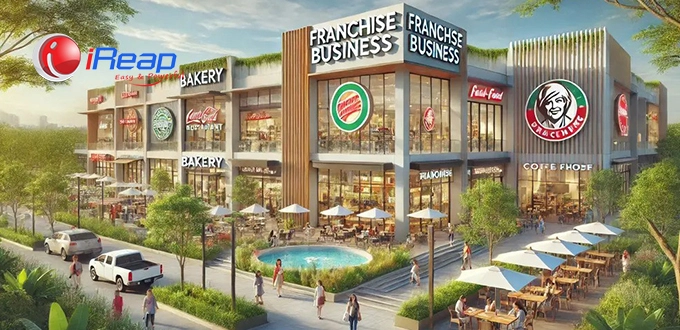
Franchise businesses have become a popular choice for many professional entrepreneurs seeking to own a business with lower risk. This business model offers significant advantages with a proven system and a well-known brand.
In this article, we will explore what a franchise business is, how it works, and various other aspects that need to be understood before starting or purchasing a franchise business.
Definition of Franchise
A franchise is a business model where a franchisor (the business owner) grants the right to a franchisee to operate the business using the trademark, products, and operational system that have already proven to be successful.
This is an effective way to expand a business without having to invest substantial capital. In this context, the franchisor acts as a mentor or advisor, while the franchisee operates the business on the ground.
How a Franchise Works
The franchise model involves an agreement between the franchisor and the franchisee. The franchisor provides support such as training, marketing, and operational guidance, while the franchisee pays an initial fee and monthly royalties.
The franchisee must adhere to the standards and guidelines set by the franchisor to maintain brand consistency.
Typically, the franchisor also supplies certain raw materials or products to the franchisee to ensure consistent product quality.
Benefits of a Franchise Business
- Brand Recognition: Utilizing a well-known brand makes marketing easier and attracts customers quickly.
- Support System: Support from the franchisor in business operations, including initial and ongoing training.
- Training: Comprehensive training to ensure the franchisee has the necessary skills and knowledge.
- Marketing: Access to proven marketing strategies, including national campaigns and local marketing materials.
- Reduced Risk: Lower risk of business failure due to the use of a proven business model.
Types of Franchises
- Product Franchise: Focuses on the distribution of specific products, such as cars or clothing. Example: car dealerships or branded clothing stores.
- Service Franchise: Provides services to consumers, such as fitness or healthcare. Example: gyms or health clinics.
- Manufacturing Franchise: Allows the franchisee to produce products under the franchisor’s brand, often found in the food and beverage industry.
Examples of Successful Franchise Businesses
Examples of successful franchise businesses include McDonald’s, KFC, and Starbucks. In Indonesia, franchises like Indomaret and Alfamart are also very popular.
Additionally, there are successful local franchises such as Es Teler 77 and J.CO Donuts. The success of these businesses demonstrates the great potential of the franchise model.
Capital Requirements for a Franchise Business
The capital required to start a franchise business varies depending on the brand and type of business. This includes the initial fee for the license, monthly royalty fees, and other operational costs such as rent and employee salaries.
Some franchises may also require the franchisee to have a reserve fund to cover operational costs during the first few months.
Top Franchises in Indonesia
In Indonesia, some of the top franchises include Indomaret, Alfamart, and J.CO Donuts. These franchises are known for their good systems and high profit potential.
For example, Indomaret and Alfamart offer daily necessities at affordable prices and strategic locations. J.CO Donuts, on the other hand, is famous for its high-quality donuts and coffee, attracting customers from various backgrounds.
Advantages and Disadvantages of Franchises
- Advantages:
- Support and training from the franchisor, helping the franchisee run the business successfully.
- Lower risk compared to starting a business from scratch, as it uses a proven business model.
- Strong brand recognition, which helps attract customers quickly.
- Access to high-quality raw materials or products provided by the franchisor.
- Opportunity to learn from other franchisees.
- Disadvantages:
- High initial fees and royalties, which can be a financial burden.
- Limited creativity and innovation, as the franchisee must follow the franchisor’s standards.
- Dependence on the franchisor’s reputation, meaning any issues with the franchisor can affect the franchisee.
- Obligation to adhere to all operational guidelines and procedures, which can limit flexibility in running the business.
Starting a Franchise Business
To start a franchise business, the first step is to conduct research and choose a franchise that matches your interests and financial capabilities. Then, contact the franchisor to obtain further information and begin the application process.
This process usually involves a financial feasibility review and an interview to ensure your suitability as a franchisee. Once approved, you will sign the franchise agreement and undergo training provided by the franchisor.
Benefits of Franchises for New Entrepreneurs
For new entrepreneurs, franchises offer significant support in operations and marketing. With a proven system, the risk of business failure can be minimized, providing a greater chance of success.
Additionally, franchisees gain access to training and resources that help them quickly understand the intricacies of the business. This provides a solid foundation to start a business and achieve success.
Requirements for Obtaining a Franchise
Each franchisor has different requirements for obtaining a franchise. Typically, these include a minimum capital, strategic location, and a commitment to follow the operational standards set by the franchisor.
Some franchisors may also require prior business experience or specific skills. Additionally, the franchisee must be prepared to undergo training and regular evaluations conducted by the franchisor.
Food and Beverage Franchises
Franchises in the food and beverage sector are very popular due to high market demand. Examples include KFC, McDonald’s, and Starbucks. These franchises offer widely recognized products and a proven system.
The success of food and beverage franchises often depends on a strategic location, product quality, and good customer service.

Minimarket Franchises
Minimarket franchises like Indomaret and Alfamart are very popular in Indonesia. They offer a variety of daily necessities with an efficient operational system and strong brand recognition.
These franchises usually require substantial capital for license fees, store renovations, and initial inventory. However, the profit potential from minimarket franchises is very high due to high consumer demand.
Differences Between Franchises and Licenses
Franchises and licenses are often equated, but they are actually different. Franchises involve the use of a comprehensive brand and operational system, while licenses only grant the right to use a specific brand or product without comprehensive operational support.
In a franchise, the franchisee must follow strict guidelines and standards, whereas in a license, the licensee only needs to comply with the brand or product usage agreement.
How to Buy a Franchise
Buying a franchise involves several steps: selecting the right franchise, contacting the franchisor, reviewing and signing the franchise agreement, and preparing the capital and business location. Be sure to conduct thorough research before making a decision.
Additionally, it is important to consult with financial and legal experts to understand all aspects of the franchise agreement and ensure that your investment is secure.
Trends in the Franchise Business
Franchise business trends continue to evolve with innovations in technology and changing consumer needs.
Some recent trends include the use of digital technology for operations, an increased focus on customer service, and the growth of franchises in the health and fitness sectors.
Additionally, there is a growing interest in franchises that offer eco-friendly products and technology-based services.
International vs. Local Franchises
International franchises usually have stronger brand recognition and more structured operational systems. However, local franchises may be more relevant to local culture and market needs, and have lower investment costs.
International franchises often require higher license and royalty fees but offer more comprehensive support and a broader market reach.
Conversely, local franchises are more flexible and can adapt more quickly to changes in the local market.
Profitable Franchises
Some franchises known to be very profitable include McDonald’s, KFC, and Starbucks. In Indonesia, franchises like Indomaret and Alfamart also provide significant profits for franchisees.
The success of these franchises is often due to strong brand recognition, strategic locations, and solid operational support.
Profitable franchises usually have a good track record and offer a high return on investment (ROI) to franchisees.
Franchise Investment Costs
Franchise investment costs vary depending on the brand and type of business. These costs include the initial license fee, royalty fees, training costs, and operational costs.
It is important to calculate all these costs before deciding to buy a franchise.
Additionally, ensure you have a reserve fund to cover operational costs for the first few months, as the business may take time to reach breakeven and start generating profits.



